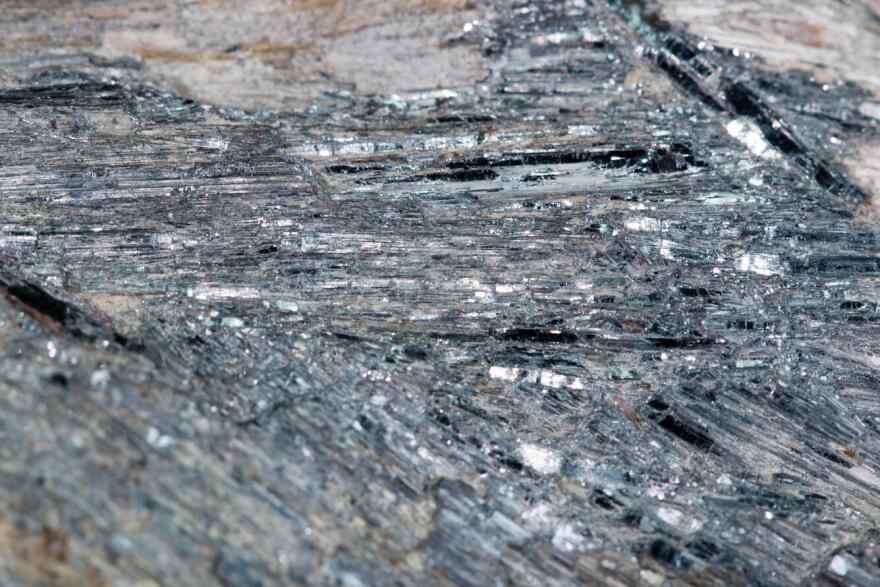As the race to mine antimony is gaining traction in Alaska, so is the rush for the federal government’s financial backing.
Now, the Trump administration is injecting millions of dollars into an Australian company’s project about 100 miles northwest of Anchorage.
Nova Minerals isn’t the only antimony interest in Alaska hoping for investment from the feds, but this week, the Pentagon awarded a grant worth more than $43 million to the Alaska subsidiary of Nova, Alaska Range Resources. The money is intended to turn the company’s Estelle Project, located in the Mat-Su Borough, into a hub for producing munitions materials.
Nova CEO Christopher Gerteisen said the project is on a two-year schedule, and that he doesn’t anticipate that the ongoing government shutdown will affect the funding.
“And so what this grant is for is to further define our resource out there, and then to mine the material, and then … process the material, to produce the munitions-grade ‘antimony trisulfide,’ they call it,” he said in a short interview.
Antimony, which is often associated with gold deposits, has a number of possible applications, including flame retardants, solar panels, semiconductors and ammunition. The U.S. government considers it a critical mineral.
Antimony was mined in Alaska off and on between 1905 and 1986, typically in response to wartime needs or higher prices. The revived interest comes amid a push from the federal government to boost mineral production and China’s ban on antimony exports to the U.S. China has been the United States’ biggest supplier of the mineral.
The award to Nova Minerals comes through Title III of the Defense Production Act, which allows the President to approve aid for businesses that buttress productive capacity for national defense purposes. That’s a lever the Biden administration also pulled to bolster critical mineral production and reduce reliance on foreign supply chains.
Gerteisen said the award will fund what he calls a pilot phase. He said Nova hopes to later build a refinery at Point MacKenzie in Southcentral to produce more than munitions with Alaska’s antimony.
“This grant is so important for Alaska because the race is on. Other states have some antimony discoveries, and this and that,” he said. “And the race is really on as to … where is the antimony refining hub is going to be for the United States.”
Other companies with antimony projects in Alaska may have different models, goals, and stages than Nova. But, on top of the mineral they want to mine, the companies share at least one other thing in common: They’re also looking to tap the Trump administration for funds.
Dallas-based U.S. Antimony plans to recover the mineral from discarded rock waste at historic mining sites in Alaska and truck the ore down to its smelter in Montana. The company began its first small-scale antimony reclamation in Alaska in early September at the Mohawk Mine near Ester.
And last week, U.S. Antimony inked a $245 million contract with the Defense Logistics Agency to supply antimony ingots to the Defense Department’s store of critical minerals.
In response to a question about U.S. Antimony’s efforts to secure federal funding, Vice President of Investor Relations Jonathan Miller sent KUAC a link to a September investor’s conference.
During the conference, Miller said the company has been working with Pentagon officials throughout the year.
“At the DoD’s request, we put together scope papers and white papers for a grant, essentially outlining what would be needed for us to expand our operations and our claims,” he said at the time.
Miller said in the presentation that the company will likely announce a federal award of just under $30 million in the near future. That was before the government shutdown began, however, and it wasn’t immediately clear how, or if, that timeline might be affected. Miller also did not say whether the money would be directed toward the company’s Alaska operations during the conference.
In an email Wednesday, Miller congratulated Nova on their award, and suggested companies should approach the endeavor collaboratively.
“We believe it’s critical to build bridges with Nova and with all miners in Alaska who are producing, or will produce, antimony in the future,” he wrote.
Another Australia-based mining company, Felix Gold, still says it’s targeting the end of this year to start mining antimony at its Treasure Creek project just north of Fairbanks.
Similar to the other two companies, Felix Gold has also formally sought federal support for that plan, and the company is touting a visit from officials with the Environmental Protection Agency and Federal Permitting Council, saying their recent stop at Treasure Creek represents a “substantive milestone.”
In a call with investors last month, Felix Gold Executive Director Joseph Webb said the visit was “as good as you can get” and helped the company’s case, but that he couldn’t guarantee anything just yet.


